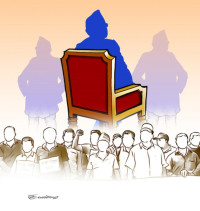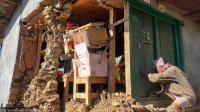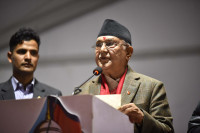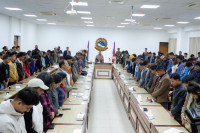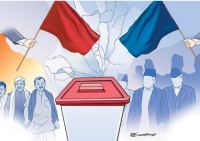Opinion
Churning the ocean
Until parties understand the aspirations for federalism, constitution drafting will remain tedious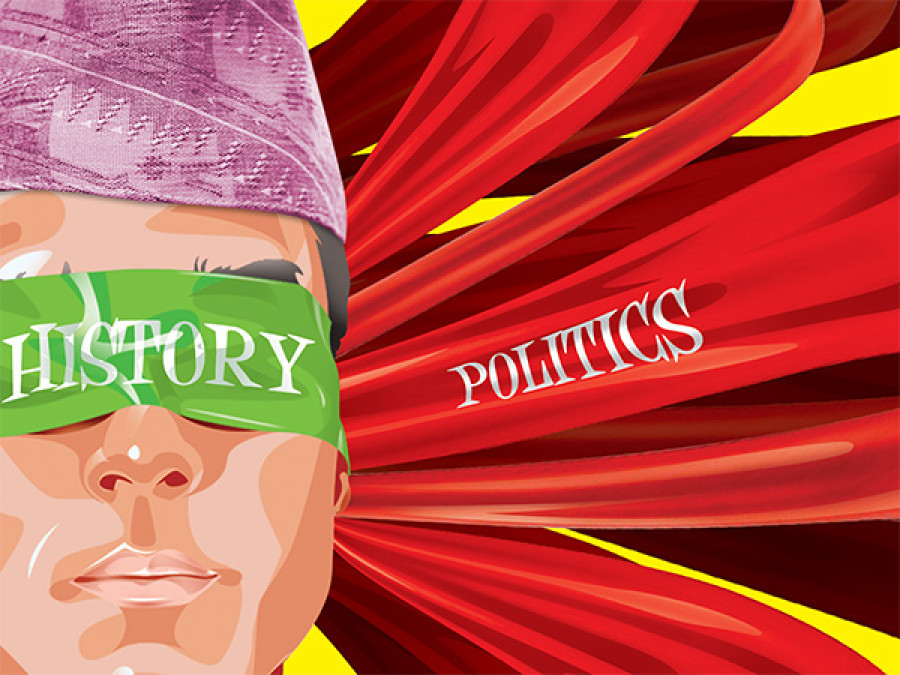
In recent days, even before the opposition’s show of force in the Capital, the Nepali Congress (NC) had taken a u-turn. During the meeting of its central committee last Wednesday, early speakers had set the tone for reconciliation with the opposition alliance.
There is a growing feeling in the NC that an understanding must be reached with the opposition. Combined with this is the feeling in the party that the nation’s agenda has been hijacked and led by the CPN-UML. If a constitution comes through a two-thirds majority, the UML will take the credit. If the opposition has its say, then Prachanda will take the credit. NC, as it appears now, has lost its significance.
The path of a two-thirds majority is fraught with risks, given the fact that the political difference between the parties in government and opposition reflects a deeper division within the society.
Expressions of discontent
Prior to the mass meeting in Kathmandu, the opposition’s rallies have been drawing an encouraging number of people. For example, in Rukum, where UCPN (Maoist) leaders, Baburam Bhattarai and Janardan Sharma, were speaking, the turnout was unprecedented, something that had never been seen before.
In Kalaiya, Bara, the people’s discontent spilled on the streets when the government decided to move a service center from Kalaiya to Simara. For the Madhesis, it was symbolic of the UML’s intentions of serving the hill communities and ignoring the Madhesi communities.
The manner in which the government handled the discontent bears resemblance to the mid-90s when the impact of the Maoists’ war was just being felt. As it did back then, the government still considers these expressions of discontent as a ‘law and order’ problem. The 30-party alliance is also a part of this problem. In Kalaiya, the Home Ministry’s primary concern, according to reliable sources, was to “show the presence of the state.” The way to do it was by mobilising the riot police and charging lathis.
In recent weeks, there have been growing incidents of conflict between the UML supporters and Madhesis in the Tarai, to the extent that the UML central committee publicly expressed concern at the worrying trend. If the political parties, especially UML, do not seek a path of reconciliation, this conflict is only likely to grow.
That these issues are related to federalism is not a coincidence. The issue of federalism has become an issue of prestige for the Madhes-based parties.
How federalism can help Madhes is a bigger debate that has been postponed for the future. Some intellectuals and the UML use the argument of prosperity as a stick to beat the Madhesis, saying that the plains need to be merged with the hills if people in Tarai are to prosper. But Madhesis insist that a single district in Madhes exports more than Rs 7 billion worth of sugarcane and vegetables. For them self-rule and dignity, thus, are as important as the debate on how Madhes can prosper.
The NC-UML coalition can push their agenda of federalism. But they can do so only after convincing the Madhesi and Janajati communities.
Restoring dignity
Now, as the parties begin to reconsider the prospects of protracted conflict, they are willing to go back to the dialogue table. Discussions over the process, content and timeline have become intertwined.
There must be consensus on the issue of federalism. The other issues, like electoral system and forms of government, can be decided through a parallel process supported by the requisite dialogue mechanism.
The dignity of the parties in dialogue needs to be restored as well; so does the neutrality and convening power of the Constituent Assembly (CA) Chair. This is something that has been mentioned before.
The best way to restore trust and confidence among parties is to start a dialogue process that demonstrates the sincerity of top leaders to reach an agreement. The dialogue processes so far indicate that the top leaders were never really interested in reaching consensus. It was the single most important factor that turned into a self-fulfilling prophecy.
There are many ways to demonstrate such sincerity. One way is to delegate authority to a powerful dialogue team that can develop options on contentious political issues.
A second way is to discuss why we are talking about federalism, and how that aspiration for it can be reflected in the model we choose. Unless political parties arrive at a common understanding about the ‘why’, or at least really understand the aspirations, Nepal’s political conflict will continue.
The third way is to identify a series of milestones, the completion of which will demonstrate the sincerity of the dialogue partners. One such milestone could be the CA’s new work-schedule, which expired on January 22. Without a new schedule, all proceedings of the CA since January 22 have become illegitimate.
The challenge, however, continues.
Opportunities in crisis
If neither the opposition alliance nor the ruling coalition is flexible, we will see a new constitution through a two-thirds voting process. But the opposition then could
boycott the CA. There are few signs of that happening. In his speech in Jhapa on Monday, UCPN (Maoist) Chairman Prachanda said they would not abandon the political process.
A new constitution through a two-thirds process is possible if the opposition relents. If the opposition or UML is not flexible, and if the NC softens, then the constitution drafting process will be delayed indefinitely.
With the Congress softening, the UML has already become suspicious of its partner. The UML is now threatening the NC that it will pull out of the government if the NC fails to push forward the ‘process’ in the CA.
However, if the NC is to carefully reconsider its position, it can play a meaningful role. As of now, it is the only party that can maintain national unity and deliver a constitution that can excite people.
There is an opportunity in every crisis. Even the opposition alliance’s rigid stance had something positive. Speaking during the mass meeting on Saturday, Bhattarai mentioned that the nation was a rainbow of different communities and ethnic groups. The opposition has managed to bring together different communities together, including the people of the hills, Madhesis and Janajatis. In the process, the opposition has strengthened national unity.
This opportunity should be grasped by the ruling coalition. The constitution-drafting process has become akin to Samundra-Manthan, or churning of the ocean. During the process, unintended concoctions can emerge, but ultimately, the process is for the good of the country.




 7.12°C Kathmandu
7.12°C Kathmandu